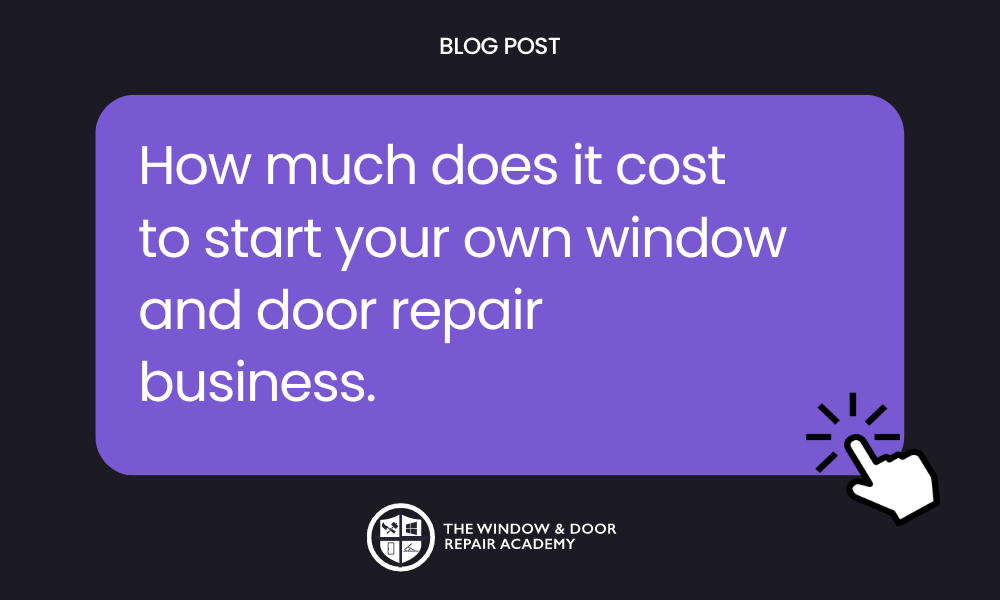It’s an exciting and potentially profitable venture, but let’s face it – the initial investment can be daunting. But fear not! We’ve got you covered. In this blog post, we’ll break down the costs involved in starting a window and door repair business and give you a better understanding of what to expect.
Initial Investment
First up, the initial investment. Depending on the size and scale of your business, the following expenses are typically required:
Equipment: To get your business up and running, you’ll need hand tools, power tools, and specialized equipment. The cost of equipment can range from a few hundred pounds to several thousand pounds.
Vehicle: Getting your tools and materials to job sites is essential, which is why a reliable vehicle is a must. Whether you’re looking for a used van or a brand new truck, leasing options are available to make it more affordable.
Insurance: Protecting your business and employees is critical, which is why liability insurance, worker’s compensation insurance, and other types of insurance are necessary. The cost of insurance can range from a few hundred pounds up to a thousand pounds annually.
Marketing: To attract customers, investing in marketing is crucial. This can include developing a website, designing business cards and flyers, and other marketing materials. The cost of marketing can vary from a few hundred pounds to several thousand pounds.
Ongoing Investment
But that’s not all – there are ongoing expenses to consider once your business is up and running:
Materials: Your business will need to purchase materials to complete jobs. This can include glass, hardware, and other supplies. The cost of materials can vary depending on the size and complexity of the job.
Labour: If your business has employees, the cost of labor will be an ongoing expense. This can include salaries, payroll taxes, and benefits.
Rent: If your business operates out of a physical location, rent will be an ongoing expense. The cost of rent can vary depending on the location and size of the space.
Utilities: If your business operates out of a physical location, utilities will be an ongoing expense. This can include electricity, gas, water, and internet.
Conclusion
Starting a window and door repair business requires a reasonable initial investment, but it can be a profitable venture if done correctly. The total cost of starting a window and door repair business can vary depending on the scope of the business, but it can range from a few hundred pounds to a few thousand pounds. Ongoing expenses such as materials, labor, rent, and utilities must also be considered when budgeting for a window and door repair business.
Are you ready to start your own window and door repair business?
With this breakdown of costs, you’ll be well on your way to budgeting and planning for your business’s success.
Don’t let the initial investment hold you back from pursuing your dream – take the leap and watch your business thrive.
Any Questions?
If you have any questions about our course please get in touch we’ll be happy to have a chat and answer any questions you have.
Bonus content
Our advice for those just getting started.
We understand that starting a new venture can be overwhelming, especially when it comes to budgeting for essentials. But don’t worry, we’ve got you covered with our essential list of expenses to consider.
Invest in Training: Enhancing your skills and knowledge can increase your earning potential. Consider learning not just how to change sealed units but also how to change hardware as well as glass.
Invest in Quality Tools: The great news is that most of the tools for double glazing repair are affordable, so you can start small and build up your collection as your business grows.
Get the Right Vehicle: A reliable van is essential, and you must get one that is of the correct size. A mid-sized van like a Dispatch, Vito, or Transit is ideal. Plus, fleet vans that are regularly serviced and maintained can be budget-friendly.
Insurance: Protect yourself and your business with the necessary insurance coverage. Van insurance and public liability insurance are the bare minimum, but you can also consider accident, sickness, key worker, and loss of earnings cover.
Stock Up: You don’t need to carry a lot of stock to get started. You can start with as little as £500/£750 worth of stock.
Invest in Marketing: This is where the big bucks can come in. While some marketing items like a website or a Facebook page are affordable, others like SEO, social media marketing, and adverts can be costly. But done correctly, they can be great investments for generating business. Consider networking as well, as it can be an effective and budget-friendly way to generate leads.
